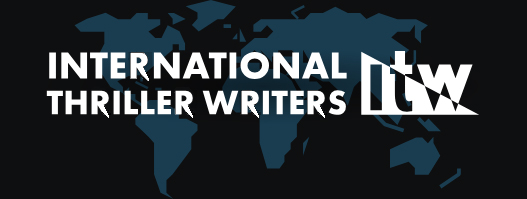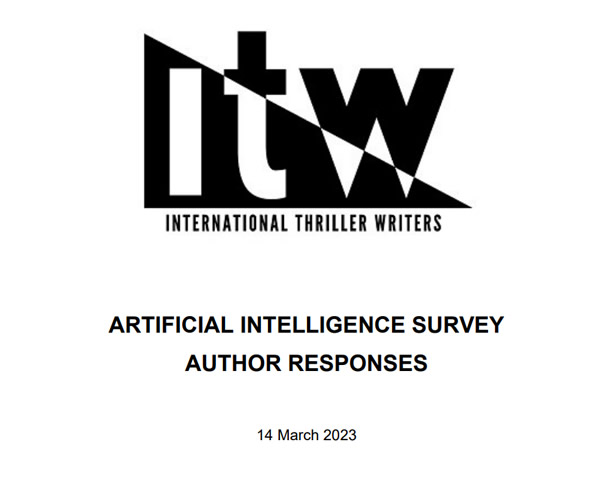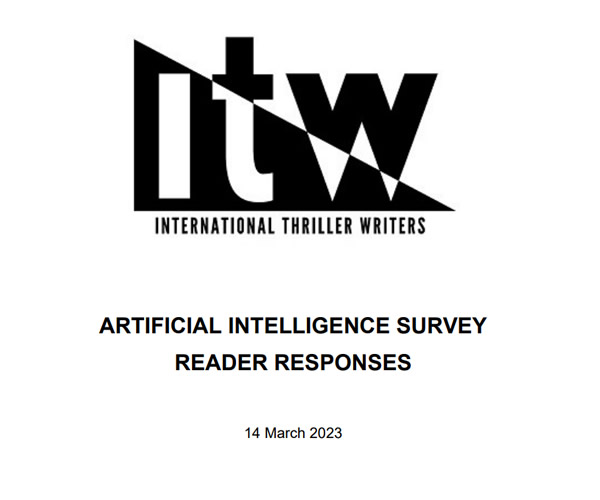Artificial Intelligence Survey
ITW has completed outreach on the topic of AI in publishing, and the results are compiled below.
We’ll also be completing other studies to make sure our membership is kept abreast of the innovations in our ever-changing industry.
With the recent release of GPT-4 and the rise in popularity of sites such as ChatGPT, the author community has been buzzing with talk about AI. Should I use it? Should I avoid it? Can it write a book? Should we let it? Will it replace…me. The truth is, none of us have those answers. What is clear is AI has become a part of all our lives and it isn’t going anywhere.
In an effort to help understand this quickly evolving landscape, ITW has conducted several surveys which can be found here:
Author Responses:
https://thrillerwriters.org/itw_docs/ITW-AI-Author-Survey-Responses.pdf
Reader Responses:
https://thrillerwriters.org/itw_docs/ITW-AI-Reader-Survey-Responses.pdf
Important Takeaways:
– Nearly everyone currently uses AI in a limited capacity (spell check, grammar, etc.)
– Very few authors ensure their contracts contain language limiting a publishers’ ability to use AI to generate material from their work.
– 93.4% of authors feel the publishing industry should have a code of conduct regarding the use of AI.
– The same percentage feel readers should be made aware when all or portions of a book have been created using AI.
– 76.1% expect AI to negatively impact author incomes within the next ten years.
– 85.7% prefer their name and works be excluded from AI training.
– 75.1% of readers would not buy a book PARTLY written using AI
– 73.3% of readers would not buy a book written ENTIRELY using AI
– 87.1% of readers would not buy a book written entirely by AI in the style of their favorite author after that author passed away.
– 93.5% of readers would not buy a book written entirely by AI even if much cheaper than books written by humans.
– 97.1% of readers believe publishers should be required to explicitly state on the cover if a book has been written using AI.
Based upon these findings, ITW will be issuing a press release (attached) calling on all publishers to:
- Commit to the clear labeling of books created partly or wholly by artificial intelligence. For the sake of clarity, this excludes the use of spelling and grammar checks.
- Work with ITW and other writing organizations to develop an industry-wide code of practice defining how AI is used in creating and producing books.
- Commit to the Author’s Guild recommended clauses on AI training as standard in publishing agreements (https://authorsguild.org/news/model-clause-prohibiting-ai-training/)
Ownership of material created whole or in part by artificial intelligence is also in debate. The U.S. Copyright Office recently launched a new Artificial Intelligence Initiative:
Issue No. 1004 – March 16, 2023
https://www.copyright.gov/newsnet/2023/1004.html
The Copyright Office states: “For a work to be copyrightable, it must owe its origin to a human being. To qualify as a work of ‘authorship’ a work must be created by a human being. It will not register works produced by a machine or mere mechanical process that operates randomly or automatically without any creative input or intervention from a human author.” They go on to say, “If a work’s traditional elements of authorship were produced by a machine, the work lacks human authorship and the Office will not register it. For example, when AI technology receives solely a prompt from a human and produces complex written, visual, or musical works in response, the ‘traditional elements of authorship’ are determined and executed by the technology—not the human user…When an AI technology determines the expressive elements of its output, the generated material is not the product of human authorship. As a result, that material is not protected by copyright and must be disclaimed in a registration application. In other cases, however, a work containing AI-generated material will also contain sufficient human authorship to support a copyright claim. For example, a human may select or arrange AI-generated material in a sufficiently creative way that ‘the resulting work as a whole constitutes an original work of authorship.’ In these cases, copyright will only protect the human-authored aspects of the work, which are ‘independent of’ and do ‘not affect’ the copyright status of the AI-generated material itself.”
As you can imagine, this complicates the application process. In response, the Copyright Office released guidance for registration when a work includes some form of AI-generated content:
https://www.govinfo.gov/content/pkg/FR-2023-03-16/pdf/2023-05321.pdf
It’s important to note for a work to be submitted to ITW as consideration for membership or an award, registered copyright must be held 100% by the author or an authorized party acting on behalf of the author. ITW reserves the right to validate authenticity through third-party software.
As creatives, we live in an exciting time. ITW will continue to monitor the advances in artificial intelligence and work with our membership, publishers, and the reading public to provide guidance as these systems evolve.
Author Responses | Reader Responses |


